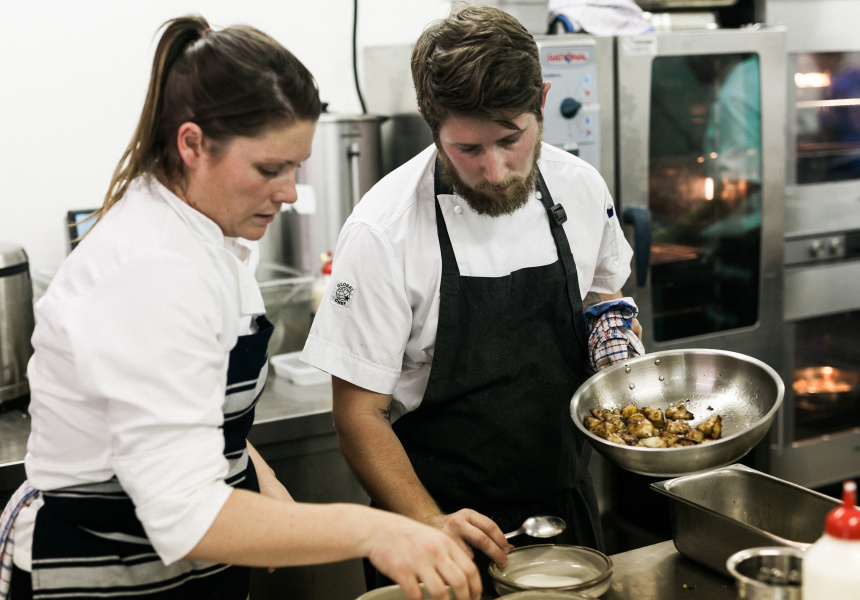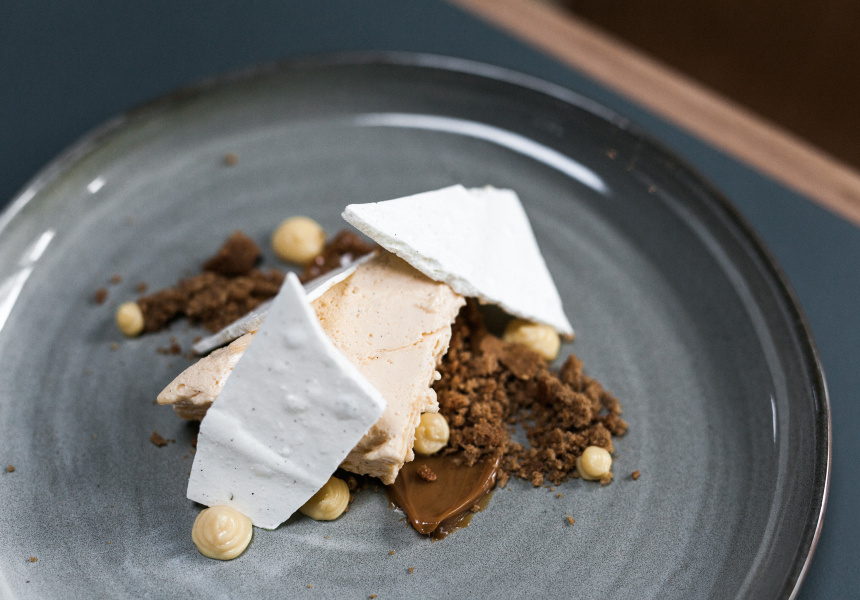“It’s like doing a cover of someone else’s song, essentially,” says Daniel Wilson, chef and co-owner at Huxtable. “Similar, but different.” He's explaining the challenge faced by chefs tasked with making another chef's recipe. Case in point: The Broadsheet Restaurant.
Since the beginning of June a kitchen team from Damm Fine Food has been working the pop-up’s kitchen, replicating some 30 dishes supplied by 18 different chefs from some of the city’s most popular cafes and restaurants. These include Jesse McTavish at The Kettle Black, Scott Pickett at The Estelle and Jesse Gerner at Añada.
“It’s been a challenge for all of us,” says Glen Davies, Damm Fine Food’s head chef. His team began working on the menu three months back. “We had four days where all the collaborating chefs came into the kitchen, one after the other, for two hours each. Then we had about a dozen people sitting around tasting their food and asking questions. Our chefs got a great deal out of it.”
We think you might like Access. For $12 a month, join our membership program to stay in the know.
SIGN UPBut reading a recipe and watching its creator make it isn’t the same thing as doing it yourself. “For the macaroni and cheese dish we supplied, the chefs mixed the smoked mozzarella through the cheese sauce beforehand,” Wilson says. “I said, ‘Oh no, what you have to do is toss the cubes through right before serving.’ That way, by the time it gets to the table, when you lift a spoonful out, the cheese is nice and stringy and delicious.”
It’s small details that can elevate a decent recipe to something far more memorable. All the on-site chefs are trained and qualified, but everyone still has different ways of doing things.
“I don’t work with recipes all that often,” says dessert specialist Pierre Roelofs, who’s spent the past six years doing everything himself, from ordering ingredients to processing them and plating up. For him, translating his unwritten routines onto paper was the biggest challenge. “This is the first time I’ve had other people do things on my behalf in a very long time,” he says. “As you can imagine, I’m quite a control freak.”
To varying degrees, this is a common quality among good chefs, for obvious reasons. “They’ve been very particular about the produce,” Davies says. “All of a sudden I’ve got another half-dozen suppliers. Jesse McTavish at The Kettle Black was very specific about what cut of meat he wanted and whether it was traceable, the whole deal.” That care extends from the paddock right into the kitchen itself, he says. “I can’t go, ‘I think that needs more salt.’ It’s not my dish to tamper with.”
Everyone agrees that without mutual trust and respect, The Broadsheet Restaurant simply wouldn’t work. “For the guys on the ground, trying to keep a whole lot of other chefs happy and being really busy at the same time, is a lot of balls to juggle,” says Dave Verheul, chef and co-owner at The Town Mouse. He contributed recipes for whole baked flathead and brussels sprouts with buttermilk, mint and parmesan.
“If you’ve got issues with trust, you’d just say no at the beginning and not be involved,” says Wilson. He already knew a few of the chefs at Damm Fine Foods and says that smoothed the process of teaching them to make his braised beef short rib and mac‘n’cheese dishes.
For his part Roelofs was a little more cautious. While savoury chefs are more known for cooking with feeling, the nature of a pastry chef’s work – lots of advanced preparation and super-precise techniques – means they’re necessarily more meticulous. Once a cake or pastry is ruined, it’s ruined. It can’t often be thinned, thickened, re-heated or otherwise salvaged. That kind of mentality is hard to teach. “Doing something like this, you’ve got to let go a little bit,” Roelofs says.
For most of the contributing chefs, the “letting go” part happened well in advance. While all the dishes are recognisably theirs, the overwhelming preference was for simple options that could be made by various chefs and prepped offsite. “My desserts can sometimes have up to 13 or 14 different components,” Roelofs says. “I think I went for five in the end.” Compromise is all part of it, things are always going to be slightly different, and that’s the beauty of it. “It’s going to be representative of what you do, but not exactly what you would do if you were standing there in the kitchen yourself,” Roelofs says.
The Broadsheet Restaurant
166 Gertrude Street, Fitzroy
June 5–August 2, 2015
Hours
Mon & Tue 7am–4pm
Wed to Sun 7am–1am


